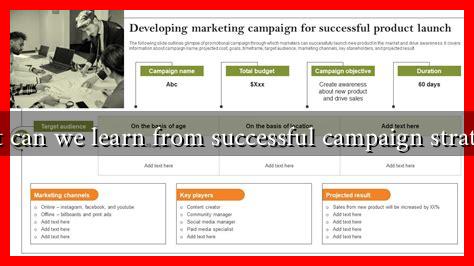-
Table of Contents
What Can We Learn from Successful Campaign Strategies
In today’s fast-paced world, effective campaign strategies are crucial for businesses, non-profits, and political entities alike. Successful campaigns not only capture attention but also drive engagement and action. By analyzing successful campaign strategies, we can glean valuable insights that can be applied across various sectors. This article explores key elements of successful campaigns, supported by real-world examples and statistics.
The Power of Storytelling
One of the most effective strategies in any campaign is storytelling. A compelling narrative can resonate with audiences on an emotional level, making the message more memorable and impactful.
- Case Study: Nike’s “Just Do It” – Nike’s iconic slogan is more than just a tagline; it encapsulates a story of perseverance and determination. The brand’s campaigns often feature athletes overcoming obstacles, which inspires consumers to connect with the brand on a personal level.
- Example: Dove’s Real Beauty Campaign – Dove’s campaign challenged traditional beauty standards by showcasing real women of all shapes and sizes. This narrative not only promoted self-acceptance but also fostered a community around the brand, leading to increased sales and brand loyalty.
Targeting the Right Audience
Understanding your audience is critical for any campaign’s success. Tailoring messages to specific demographics can significantly enhance engagement and conversion rates.
- Example: Spotify’s Personalized Playlists – Spotify uses data analytics to create personalized playlists for users, enhancing user experience and engagement. This targeted approach has helped Spotify maintain a competitive edge in the music streaming industry.
- Case Study: Obama’s 2008 Campaign – Barack Obama’s campaign effectively utilized social media to reach younger voters. By targeting specific demographics with tailored messages, the campaign successfully mobilized a previously disengaged electorate.
Utilizing Multi-Channel Approaches
Successful campaigns often employ a multi-channel approach, leveraging various platforms to reach their audience. This strategy ensures that the message is seen by as many people as possible.
- Example: Coca-Cola’s “Share a Coke” Campaign – Coca-Cola’s campaign involved personalized bottles with popular names, which were promoted across social media, television, and in-store displays. This multi-channel strategy led to a 2% increase in sales in the U.S. alone.
- Case Study: ALS Ice Bucket Challenge – This viral campaign utilized social media to spread awareness about ALS. Participants filmed themselves pouring ice water over their heads and challenged others to do the same, creating a ripple effect that raised over $115 million for ALS research.
Measuring Success and Adapting Strategies
Successful campaigns are not static; they evolve based on performance metrics and audience feedback. Continuous measurement and adaptation are essential for long-term success.
- Example: Airbnb’s Marketing Strategy – Airbnb continuously analyzes user data to refine its marketing strategies. By measuring engagement and conversion rates, the company can adapt its campaigns to better meet user needs.
- Case Study: Old Spice’s “The Man Your Man Could Smell Like” – This campaign initially targeted a specific demographic but quickly adapted based on audience reactions. The humorous approach resonated widely, leading to a 125% increase in sales.
Conclusion: Key Takeaways from Successful Campaign Strategies
Successful campaign strategies offer valuable lessons that can be applied across various fields. Here are the key takeaways:
- Storytelling is powerful: Craft narratives that resonate emotionally with your audience.
- Know your audience: Tailor your messages to specific demographics for better engagement.
- Use multi-channel approaches: Leverage various platforms to maximize reach and impact.
- Measure and adapt: Continuously analyze performance metrics to refine your strategies.
By incorporating these elements into your campaigns, you can enhance your chances of success and create lasting connections with your audience. For more insights on effective marketing strategies, consider exploring resources like Harvard Business Review.

